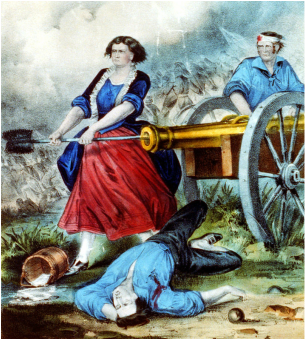 Source: Library of Congress Prints and Photographs Division. Originally published by Currier & Ives, [between 1856 and 1907]. Source: Library of Congress Prints and Photographs Division. Originally published by Currier & Ives, [between 1856 and 1907]. Known for rolling up her sleeves and doing her part during the American Revolution, Molly Pitcher not only tended to the medical and washing needs of soldiers in battle, she even jumped in to take over operating heavy weaponry. Molly’s bravery transformed her into a symbol and a story showcasing women's’ efforts during the United States’ fight for independence. Early Life Molly Pitcher was born Oct. 13, 1754 to the name Mary Ludwig. Though Molly was a popular nickname for Mary at the time, her second nickname came only after she pitched into the American colonists’ efforts during the American Revolution. After growing up near Trenton, New Jersey, Mary moved to Carlisle, Pennsylvania where she met a local barber named William “John” Hayes. The two later married a year later in 1769, just seven years before colonies declared independence from Great Britain. Wartime Efforts When the Revolutionary War broke out, Hayes joined the war efforts as a gunner for the Continental Army. During this time, it was not uncommon for soldiers’ wives to stay nearby, even on the battlefield, to assist. At Valley Forge, Molly along with other women, like Martha Washington, did their parts by washing clothes and attending to the sick and injured. In 1778, while the men practiced training drills, Molly served as a water carrier. Molly’s participation in training paid off on the battlefield. At the Battle of Monmouth, she earned her nickname “Molly Pitcher” due to her tireless efforts and dedication to bring soldiers pitchers of water during the battle. The battle was fought on a scorching hot day, but as long as the men battled, Molly continued to return again and again to the spring near by, fill her pitcher with fresh water and bring to soldiers. The soldiers not only needed water to quench their own thirsts during the fight, but also, water was essential in keeping their cannons cool on this hot day. However, supplying water was not all Molly did during the Battle of Monmouth. When Molly saw her husband fall down, she took Hayes’ spot manning his cannon. Not missing a beat, Molly stood her post through the battle. In his memoirs, Continental Army soldier Joseph Plumb Martin wrote the following, which is believed to have been about Molly: "A woman whose husband belonged to the artillery and who was then attached to a piece in the engagement, attended with her husband at the piece the whole time. While in the act of reaching a cartridge and having one of her feet as far before the other as she could step, a cannon shot from the enemy passed directly between her legs without doing any other damage than carrying away all the lower part of her petticoat. Looking at it with apparent unconcern, she observed that it was lucky it did not pass a little higher, for in that case it might have carried away something else, and continued her occupation." Molly’s bravery won her more than just the nickname, Molly Pitcher, but also a second nickname of Sergeant Molly, after George Washington honored Molly by naming her a non commissioned officer through the issue of an official warrant. Molly became a symbol of women’s wartime efforts during the fight for American Independence. Later Life After the war, Molly went back to Pennsylvania and had a son with Hayes. However, just three years later in 1786, Hayes died. Molly went on to remarry a war veteran named John McCauley in 1793. Though reportedly an unhappy marriage, Molly’s wartime efforts were not forgotten. The Pennsylvania legislature honored Molly in 1822 for her services, giving her an award of $40 per year for the rest of her life; however, most of Molly’s other recognitions came postmortem. Molly died in 1832 in Carlisle. A monument honoring her wartime service marks her place of rest. In 1928, the U.S. Postal Service created a Molly Pitcher stamp and during World War II her name was honored on the Liberty Ship SS Molly Pitcher. Additionally, today, drivers will find that part of US Route 11 is also known as Molly Pitcher Highway. - Lisa Zimmermann
0 Comments
Your comment will be posted after it is approved.
Leave a Reply. |
Archives
July 2017
Categories
All
|
 RSS Feed
RSS Feed